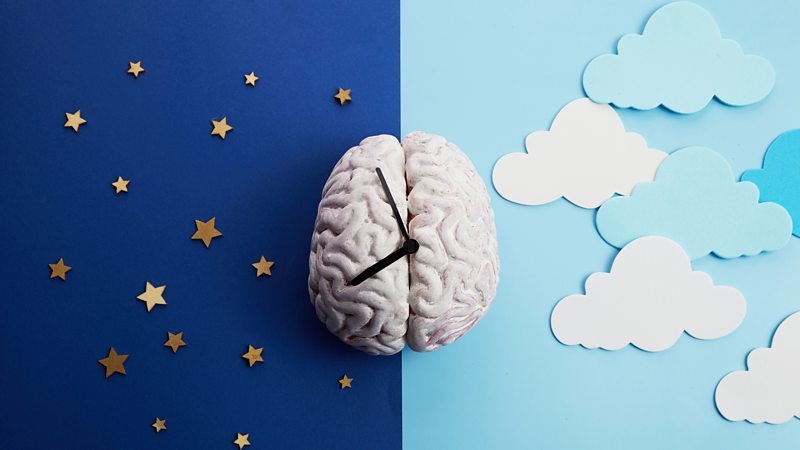Melatonin is becoming a popular supplement for those struggling with sleep. But there has recently been a big spike in the number of overdoses. What harm can too much of it do?
Hands up those who use their smartphone in bed. From frantically scrolling to catch up on the latest news, to browsing social media channels at night – the blue light of the smartphone is never far away.
Yet studies show replacing bedtime with screentime is having a devastating impact on our sleep. The reason is all down to melatonin, a hormone produced in the brain's pineal gland. Melatonin has a key role in regulating the body's sleep-wake cycle. It is sometimes referred to, rather spookily, as "the hormone of darkness", as levels are low during daytime, but rise at night once darkness descends.
Anything that increases light at bedtime – such as the suffuse blue glow of electronic screens – will therefore hamper melatonin production, and make sleep ever more elusive. That may help explain why as many as one in three US adults aren't getting the seven to eight hours of sleep that most people need.
It's no surprise, then, that millions of people are turning to melatonin supplements to help them combat insomnia, jet lag, or difficulty sleeping following night shifts. While melatonin in the UK requires a prescription, in the US it is freely available over the counter, and found on shelves next to vitamin supplements. Children are even given melatonin "gummies" from a young age to help them sleep through the night.

Millions of people are turning to melatonin supplements to help them combat insomnia, jet lag, or difficulty sleeping (Credit: Getty Images)
Yet there is mounting disquiet amongst some doctors and physicians that melatonin may not be as safe as it is marketed to be.
During the coronavirus pandemic, Michael Toce, a paediatric emergency medicine doctor at Boston Children's Hospital, noticed an alarming trend. The number of children admitted to his department having taken an overdose of melatonin was rocketing.
"We were seeing young children who had accidentally swallowed melatonin, and adolescents who presented after consuming melatonin in an attempt to self-harm," Toce told BBC Future.
A 2022 study co-authored by Toce found that between 2012 to 2021, the number of yearly calls to poison control for child melatonin overdoses rose by 530%. By 2020, poison control services were receiving more calls about children overdosing on melatonin than for any other substance.
It's important to note that the majority of children across both studies suffered no symptoms at all
This finding was echoed in a later June 2023 study, which reported that the number of children attending emergency departments in the US from melatonin overdose increased by 420% over a decade.
"The increase in poisonings is most likely secondary to the increase in the use of melatonin," says Toce.
"Melatonin sales have increased in recent years, as has paediatric melatonin use. Kids get poisoned by what is in their environment; thus, increased availability of melatonin will lead to increased poisonings."

Melatonin has a key role in regulating the body's sleep-wake cycle (Credit: Getty Images)
It's important to note that the majority of children across both studies suffered no symptoms at all. If they did have symptoms they were mild, such as an upset stomach, vomiting, and some drowsiness.
However in Toce's wider study, which looked at 260,435 cases of melatonin ingestion, nearly 300 children required intensive care. Five had to be put on ventilators, and two children died.
Melatonin has been linked to other infant deaths too. A 2019 study documented two separate cases involving one nine-month-old and one 13-month-old child, both of whom were found unresponsive. Blood toxicology tests showed high levels of melatonin in both cases, with melatonin found in the sippy cup of the 13-month-old infant. However, in both cases there were other factors that may have played a role in the deaths. The first baby was found co-sleeping with an older sibling, while the second was left in a hot room – both known risk factors for sudden infant death syndrome (Sids). (Read more about the causes and prevention of Sids.)
Meanwhile there have also been reports of adverse effects in adults too. A study in May this year reported the case of a 21-year-old woman who died as a result of taking an overdose of melatonin and diphenhydramine (DPH), an over-the-counter antihistamine and sedative mainly used to treat allergies, insomnia, and symptoms of the common cold. Meanwhile another adolescent developed severe hypotension (low blood pressure), after trying to overdose on melatonin.
It's really the Wild West out there – David Ray
However, it's possible that these deaths or serious adverse reactions weren't caused by melatonin at all, but an unrelated or unknown condition.
Part of the problem is that, as it is classed as a supplement, melatonin isn't regulated by the Food and Drug Administration (FDA). Rigorous clinical trials have not been performed, so we don't fully understand the impact that the hormone has on our bodies. We don't know how it interacts with other medications and supplements, and the amount of melatonin in different products varies wildly.
"It's really the Wild West out there," says David Ray, professor of endocrinology and co-director of the Sir Jules Thorn Sleep and Circadian Neuroscience Institute at the University of Oxford.

One in three adults surveyed in a US poll said they weren't getting the seven or eight hours of sleep a night they needed (Credit: Getty Images)
"People have done studies where they've gone and bought these products and measured the amount of melatonin in them, and in not one case did it match what it said was present on the packet."
There's no known mechanism by which melatonin could be causing these deaths and extreme adverse reactions. Studies in rats and mice show that melatonin has toxic effects if given at extremely high doses (more than 400 mg/kg), but this is tens of thousands of times more than the recommended dose for treating sleep disorders, which varies between 2-10 mg.
We do know that melatonin receptors are found throughout the body, including in the reproductive, cardiovascular, and immune systems, but its effects outside of the brain are little understood. However, millions of people take melatonin every day without any known adverse effects.
"All medications have side effects, so relative to other drugs used for treating sleep it is considered to be very safe," says Sanford H Auerbach, an associate professor and director of the Sleep Disorders Center at Boston Medical Center.
"However, I think the concerns are about what is not known. If you're giving it to a developing child, what is the effect of that going to be 10 years from now? We don't know. We don't even know how much melatonin is too much because those studies just haven't been done."
- Adenman
-

 1
1



Recommended Comments
There are no comments to display.
Join the conversation
You can post now and register later. If you have an account, sign in now to post with your account.
Note: Your post will require moderator approval before it will be visible.